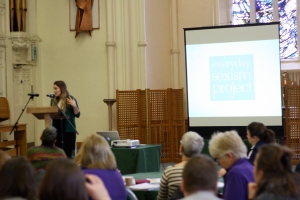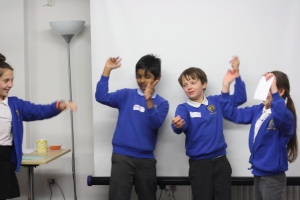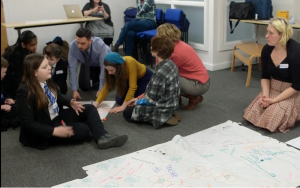Our national conference ‘Gender Respect – Youth Effect’ was a great opportunity to network with liked minded, passionate people who work with young people to give them a voice and help them to understand their right to respect, regardless of gender. The wealth of experience and the variety of professionals present enabled thought-provoking and stimulating discussions.
The day commenced with the inspirational and passionate feminist writer, Laura Bates. She is author of ‘Everyday Sexism’ and founder of ‘the everyday sexism project.’ The project promotes gender equality and is a place for people to record stories of sexism that occur on a daily basis. Laura spoke about how people can be complacent, and just accept that this is the way things are. She goes into schools and delivers talks to encourage people to speak out when they have been treated unfairly. Laura’s talk was shocking at times and contained statistics that were depressing, but she ended on a positive note, talking about how things are changing and people are feeling more able to speak out against inequality.
Feedback from participants was very positive. Project teacher Stephen said ‘I was pleased to part of the day that could potentially change the lives of so many that face inequality. Similar to Laura I would like people to challenge inappropriate actions and comments that are so offensive and hurtful to other people. It needs to start with the young and it was good to see a workshop on Early Years Education. While disappointed that very few men attended the morning session, it was pleasing to hear the message that men are important to addressing change and that they should see themselves as people who can reach out to other men who are responsible for unacceptable behaviour.’
The day continued with an overview of the Gender Respect project and the scoping study, followed by a choice of 4 workshops:
- Sexual Harassment and Masculinities – Interactive & practical ideas – how to facilitate discussions about these issues, encourage empathy, and enable safe, appropriate interventions.
- Challenging gender stereotypes – Practical ideas for lessons which develop critical and creative thinking and enable primary-aged pupils to make real choices in areas such as sport and careers.
- ‘Doing Gender’ – How young children develop ‘masculinities’ and ‘femininities’ and how we can provide an EYFS environment that promotes gender equality. This workshop will give participants an opportunity to discuss the theory around how children develop gender identities and reflect on practical approaches across the EYFS curriculum.
- Period Positive Schools – A fun, informative and interactive workshop sharing results results and resources from Chella’s research on how to include all ages and genders in menstruation education.
These workshops were well received by all and involved lots of thought-provoking discussions.
In the afternoon, Jo Sharpen, children and Young People’s Project Coordinator spoke about the Chilypep project ‘Against Violence and Abuse (AVA).’ This project works with young people who have been affected by domestic abuse. It was interesting to hear about how professionals can work with children and young people through an empowerment and participation model to shape services and provision. It was inspirational to hear from some of the young people involved in the project. Project teacher Stephen said ‘It was good to hear how the project in the afternoon had empowered so many once victims to be strong leaders of change.’
Participants chose from 3 workshops for the afternoon:
- Where do we go from here? – An opportunity to explore the YWAVE research findings and develop ideas and pledges from services/professionals/communities. A discussion around the legacy of the AVA project in Sheffield.
- In My Shoes – Interactive session exploring young people’s experiences and perspectives when engaging with multiple services and professionals in relation to domestic abuse.
- Participation and Empowerment – A look at models for working with young people. Opportunity to critically think about our practice with young people, examine the benefits and learn new strategies that can be incorporated into our work.
The day was a great opportunity for networking, encouraging one another and learning about the work of different organisations. Project teacher Stephen said ‘I would like the day to be seen as a growing platform of change across society and especially education. We need men and women to work together to address inequalities on all genders. We need to measure the success e.g. by more men working in early education, nursing, caring professions, politics and other STEM professions. We also need to measure a significant difference in the number of violent and abusive crimes against people within our communities.’
How did people describe the conference?















